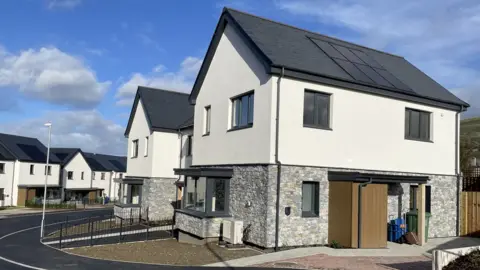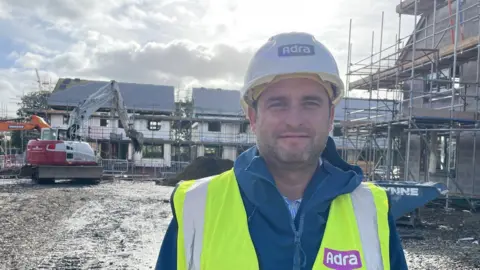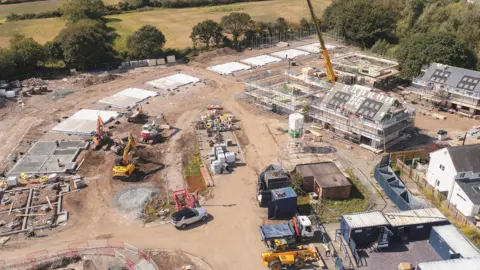Solar panels: Call for new homes to have renewable energy
 BBC
BBCSolar panels should be fitted on all new homes, major renovations and extensions in Wales, government advisers have urged.
They want an immediate review of building regulations to order the use of renewable energy in the industry.
The National Infrastructure Commission for Wales (NCIW) said big interventions were needed if 100% of electricity was to come from renewables by 2035.
The Welsh government said it would carefully consider the recommendations.
As of 2021, about 55% of Wales' electricity demand was being met from sources such as solar, wind or hydro.
But this new report said ministers lacked a clear strategy for how to reach their own target, with progress on building new green energy schemes having slowed significantly in recent years.
NICW's role is to advise on the strategic infrastructure needed over the next 80-year period.
With powers over energy policy split between Cardiff Bay and Westminster, the experts acknowledged it was a "complex" area, but said the Welsh government could be doing more to provide leadership.
 Getty Images
Getty ImagesOn housing, where control over building regulations has been in Wales' hands since the Senedd was set up, there is "little to demonstrate" that homes are being built to a more environmentally-friendly standard.
The report said housebuilders should be forced to put in green technologies to cut greenhouse gas emissions and save people money on their energy bills.
"We need to insulate ourselves - literally - from the troubles we've been having with fluctuating prices of gas and electricity," explained Nick Tune, a NICW commissioner who led the work.
A climate-friendly cul-de-sac at Pen y Ffridd Road in Bangor, Gwynedd, has two and three-bedroom properties being built for housing association Adra which come complete with enhanced insulation, solar panels, air-source heat pumps and charge points for electric vehicles.
"You're looking at maybe £20,000 more per property to install these measures," explained Adra's director of development Daniel Parry.
Grants available for social housing made it a viable and attractive option for the company, but it would be "more challenging for the private sector" and would make those homes more expensive, he added.

Asked if stricter environmental standards might put developers off, Dr Jenifer Baxter, NICW's deputy chairwoman said: "We're currently living in a time where we've declared a climate and nature emergency.
"What we expect is for all our developers... to use the technologies that contribute the minimum amount to poisoning the planet."
Rules should also be reviewed to allow homeowners living in protected areas such as national parks to put in small-scale technologies like heat pumps without the need for planning permission, the report suggested.
When it comes to wind and solar farms, the commissioners proposed that all new developments should be at least 10% community owned.
They also call for the functions of the Crown Estate in Wales to be devolved, as has been the case in Scotland since 2016.
 Wynne Construction
Wynne ConstructionThis would means funds raised from leasing access to the seabed for large windfarms off the coast would be retained by the Welsh government rather than sent to the UK Treasury.
Ministers across the UK should also set up a group to coordinate efforts to upgrade the grid network - with a lack of space for plugging in new schemes particularly in areas similar to mid Wales seen as a major barrier.
Ifan Glyn, director of the Federation of Master Builders, Cymru, said "we absolutely support the concept that we need to decarbonise homes" but acknowledged there might be disagreements over how to achieve it.
He added: "In our view the current Welsh government policy is a better one which is to set standards rather than be prescriptive in terms of the methods and the technologies being installed in our homes.
"Having that kind of flexibility gives builders the ability to innovate."
The Welsh government thanked NICW for its work on the report and said it would "consider the recommendations carefully".
